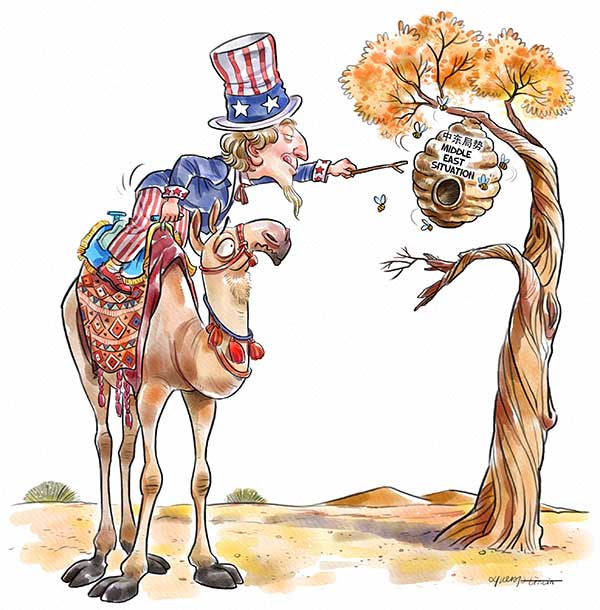Israel embassy move exposes self-seeking US


Editor's note: The United States moved its embassy in Israel from Tel Aviv to Jerusalem on Monday despite the fierce opposition from Arab and other countries. Violent clashes between Palestinian protestors and Israeli soldiers were reported from eastern Gaza Strip close to the border with Israel throughout the day, in which at least 58 Palestinians were killed and more than 2,700 injured. Three experts share their views with China Daily's Zhang Zhouxiang on the issue. Excerpts follow:
Israel could become US' Achilles' heel
Since the end of the Cold War, Palestine has been gradually marginalized in Middle East politics. And after Donald Trump entered the White House, the US has increasingly supported its allies that share its ideology. As its traditional ally and essentially a Western country, Israel has occupied center stage in Trump's Middle East policy.
In Monday's clashes between Palestinians and Israeli forces, Palestine has suffered heavy casualties. So Palestinians should use other channels to express their anger against the provocative moves of Israel and the US, instead of confronting fully armed and well-trained Israeli troops head-on. For example, they could use international forums to put pressure on the US.
For the US, Israel is not only a strategic pivot in the Middle East, but also could become its Achilles' heel, because Washington is becoming an increasingly derided power in the region, not least because it helped found the Israeli state despite the fierce opposition from Arabs and has ignored the rights of the Palestine people for long.
For example, whenever there has been a move against Israeli interests at the UN Security Council, the US has vetoed it, which has stripped the US of even the pretense of being an "impartial" mediator. And even the US decision-makers know this.
Zhao Guangcheng, a researcher at the Institute of Middle Eastern Studies, Northwestern University
Regional chaos serves Washington's interests
Trump's decision to shift the US embassy from Tel Aviv to Jerusalem is, to say the least, a reckless move. It has not only cost the lives of scores of Palestinian civilians, but also deepened the Arab-Israeli divide and dealt a heavy blow to the Middle East peace process.
However, it would be wrong to assume the US did not realize this outcome. On the contrary, the US knew what the negative effects of the move would be. That the US still insisted on moving its embassy to Jerusalem is clear evidence that conflicts in the Middle East are in Washington's interests and offer it ample excuse to intervene in the region's affairs.
US diplomacy serves the country's global strategy and interests. And in the Middle East, US interests lie in chaos, even war, not peace.
It is this logic that prompted the US to intervene in Libya and Syria, as well as aggravate the Palestine-Israel conflict. Trump may be a smart businessman, but so have been all US presidents when it comes to maximizing US interests. They have always pursued US interests even at cost of global peace and development.
Wang Jinglie, a researcher on West Asia at the Chinese Academy of Social Sciences
Trump moves dictated by domestic politics
In one week, Trump has shocked the world twice-by announcing the US' withdrawal from the Iran nuclear deal and then moving the US embassy in Israel from Tel Aviv to Jerusalem.
Trump's moves have been dictated by the demands of US domestic politics. As the midterm election approaches, the Democrats are busy preparing to gain majority in the US Congress. And if they succeed in their endeavor, Trump might face a difficult time during the rest of his term in the White House.
To prevent the Democrats from succeeding in their plan, Trump has to win the mid-term election by boosting the confidence of his voters. It was on the populist votes and the Jewish lobby's support that Trump won became US president. And both groups are pro-Israel with scant respect for the Iran nuclear deal. Therefore, at least in the coming months, Trump is likely to continue his anti-Iran and pro-Israel policies.
Hua Liming, China's former ambassador to Iran


































